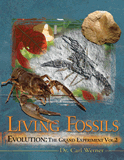
Synthetic Organism Spurs Evolution Talks
LiveScience: “Synthetic Life May Reveal Origins of Natural Life” Last week’s major announcement about the creation of a “synthetic” organism spurred evolution talk then—and continues to do so this week.
The J. Craig Venter Institute’s genetic reworking of an organism made for big news last week, and at the time, we quoted Oxford University ethicist Julian Savulescu, who linked the breakthrough to evolution. This week, a LiveScience examination of the news connects the research to evolution more vigorously. Specifically, the research may help evolutionists overcome a key problem, as explained in a revealing comment by New York University biologist David Fitch:
“You’re essentially bringing a fossil back to life.”
“People are really pretty much stuck about what actually happened on our planet to make new life forms. There have been lots of experiments that propose different ways new living systems could have arisen, and maybe some of these issues could be addressed by synthesizing new genomes with very simple kinds of pathway structures.”
Venter’s synthetic organisms could come as part of a technical solution, according to Fitch, by custom-designing bacteria to study specific evolutionary transitions, among other things. The LiveScience article also quotes University of Chicago molecular biologist Martin Kreitman, who suggested recreating “evolutionary intermediates” based on genetic reconstructions from modern organisms. “You’re essentially bringing a fossil back to life,” he said.
Apparently Craig Venter, the scientist who spearheaded the effort to create the synthetic cell, is in agreement on the issue: “I think it’ll be interesting as the people working on origins of life, people trying to understand these minimal early possible precursors to life as those programs proceed in one direction, and we proceed from the other . . . we might be able to meet somewhere in the middle and have some exciting new tools.”
But as we stressed last week, the creation of synthetic life did not bypass the need for intelligent design—in this case, by scientists from Venter’s team—who inserted and managed the information in the new cell (using a pre-existing yeast cell!). And any use of synthetic organisms to study evolution will still have to face up to the fact that Darwinian evolution cannot explain the origin of genetic information for the first living reproducing cell or the massive increases in genetic information required to explain life’s complexity and diversity from that first cell.
For more information
- Mutations
- Get Answers: Genetics, Information Theory, Mutations
Remember, if you see a news story that might merit some attention, let us know about it! (Note: if the story originates from the Associated Press, Fox News, MSNBC, the New York Times, or another major national media outlet, we will most likely have already heard about it.) And thanks to all of our readers who have submitted great news tips to us.
(Please note that links will take you directly to the source. Answers in Genesis is not responsible for content on the websites to which we refer. For more information, please see our Privacy Policy.)
Recommended Resources

Answers in Genesis is an apologetics ministry, dedicated to helping Christians defend their faith and proclaim the good news of Jesus Christ.
- Customer Service 800.778.3390
- Available Monday–Friday | 9 AM–5 PM ET
- © 2026 Answers in Genesis


